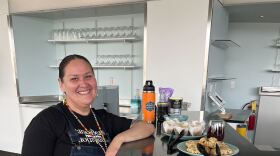Emily Yenor has been a physical therapist for the past 20 years. For the first 10 of those years, she used traditional methods like ultrasound, deep tissue stretching and more to release muscle tightness in her clients. But she was frustrated by the lack of progress she was making with her patients.
“I felt like treating the tightness, digging in on these tight muscles, trying to stretch these tight muscles — it really wasn’t getting to the root of things,” notes Yenor.
That's when she started looking for other tools to help her clients and discovered Muscle Activation Techniques — or MAT.
"It's a biomechanical, very systematic process that is designed to identity and then also treat muscular weakness at the root of injuries, impeded performance and compromised healing," explains Yenor. Developed by Greg Roskopf, now mechanics consultant for the Denver Broncos, MAT is a non-invasive approach to help muscles move efficiently.

For Yenor, MAT became a "total life-changer" for her professionally and personally. When Yenor started studying MAT and was in the early stages of an internship 10 years ago, she was involved in a roll-over car accident.
Despite being a physical therapist, recovering from the accident was the first time she needed treatment herself. Yenor's physical therapist was the first Wisconsinite to be certified in MAT — and employed the techniques to help Yenor heal.
"I felt even better than I had prior to the accident, so it was just a great confirmation that this is what I'm supposed to be doing to help other people," says Yenor.
"This is what I'm supposed to be doing to help other people."
"It was really beautiful to overcome my injuries. And also now, I know what it's like to be on the other side of the pain and function and then see it through with this particular modality," she adds.
Yenor became Wisconsin’s first female MAT certified specialist in 2010 and hasn’t looked back. She says a great deal of helping people understand MAT is educating them — particularly that muscle tightness is usually a sign of muscular weakness in another place that the body is compensating for.
"Through range of motion testing, through muscle testing, we can really determine where is the best place to intervene and try to enhance the function of the muscular system," notes Yenor.

MAT involves a full movement assessment before you get any treatment. Then, based on your assessment, you may get exercises specific to your needs. The exercises don't try to lengthen or change the muscle, notes Yenor.
No bodies are the same. But stress, overuse and injuries often result in loss of muscle contraction, which leads to a lesser range of motion and impacts your overall body performance. Yenor says MAT uses force application techniques, such as pressing on the point where muscle ligament meets the joint and specified exercises that target muscles.
Your muscles, joints, and central nervous system are all interconnected. And Yenor says MAT helps make the brain and body connection stronger.
"Our nervous system is always at the root of muscle function. So we can tap into that nervous system and kind of reboot it with certain hands-on techniques and exercise positions and activities to help the body re-learn how to move," Yenor explains.

While Yenor is a physical therapist, she notes that MAT isn't the same as physical therapy. Physical therapy treats a specific body part or injury, while MAT is a proactive method to keep your body functioning at its best.
"I wish that I could say that MAT is the end all be all when it comes to healing every single ailment," says Yenor. "Our bodies are very complex. But when you have a muscle specialist and someone who gets to know the inner workings of your body from head to toe, it's so much easier when something does flare up or if you do get a new issue, someone that already knows your body can then intervene and have a positive impact."










